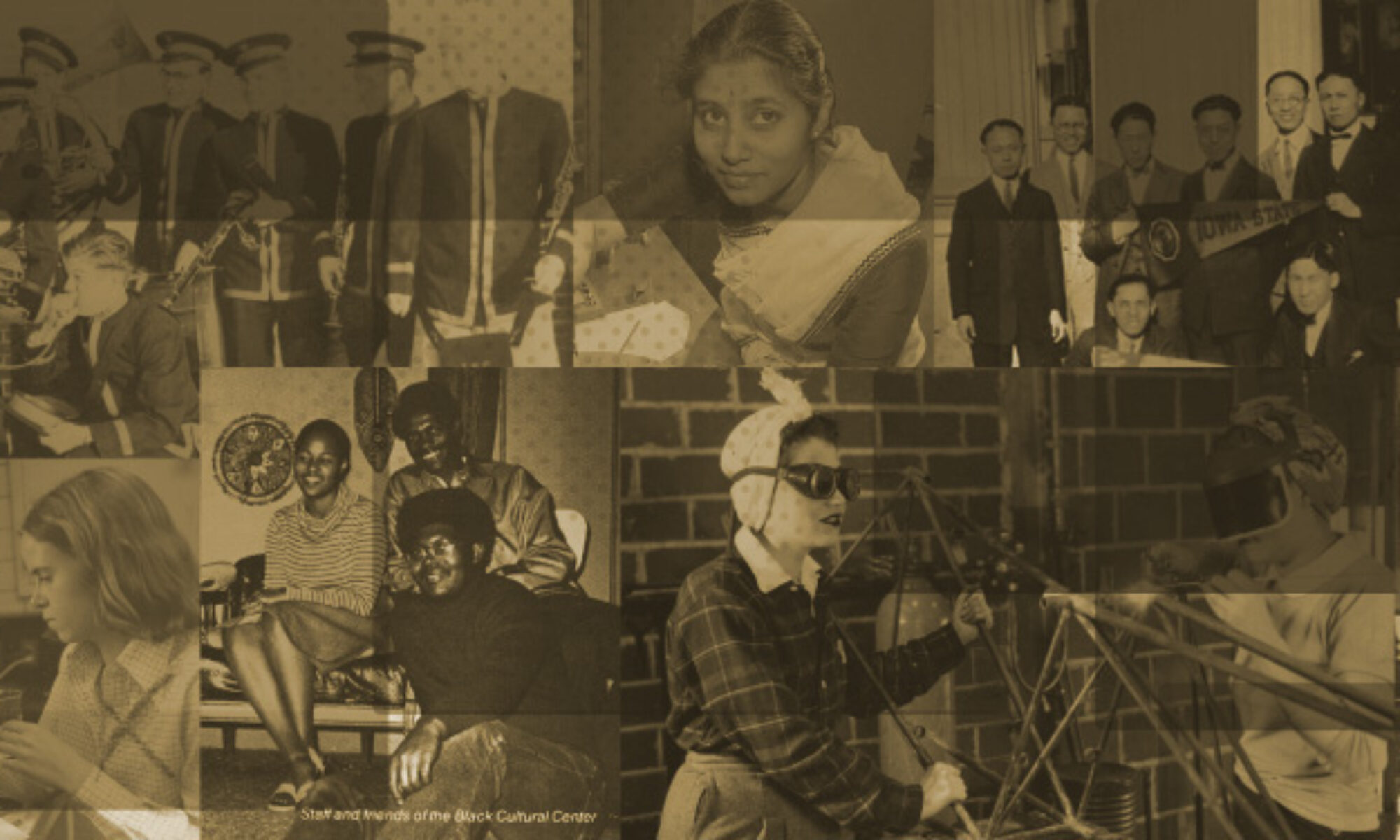Project overview
In the face of an increasingly divisive political climate and the continued rise of social justice movements calling for an acknowledgement of and an end to racism in our country’s policies and institutions, colleges and universities nationwide are addressing both historical and ongoing inequality and discrimination in higher education. Many are confronting the difficult histories of their institutions by uncovering hidden stories and voices in their archives and making them openly available often through digital means. One example is Universities Studying Slavery, a multi-institutional effort to examine the relationship between slavery and universities and the ways in which the founding and success of these universities was tied to the labor of enslaved people.
While the history of Iowa State University is not entangled with the institution of slavery in the same ways as the histories of other institutions, no institution’s history is free from racism and injustice. There is much to acknowledge as a land grant institution, for example, the dispossession and removal of indigenous groups from said land. With Iowa State University’s commitment to create an inclusive and welcoming campus environment and to reject racism and discrimination in our campus community, it is important to investigate our past, acknowledge injustice, and work to reveal stories that have not been heard.
The Tracing Race Initiative is an ongoing effort to encourage, support and facilitate digital scholarship that reveals the under-documented history of accomplishment and experience of people of color, and engage with the history of race, inequality, racism, and student, faculty and staff activism at Iowa State University. Through this initiative we will provide space and support for faculty and student research that elevates primary source materials in teaching, learning and research. This initiative will allow for creative remixing and cultural expression of the faculty and student body through these materials and expand the narrative of our collective history.
Values Statements
Inclusivity: The Tracing Race at Iowa State University initiative seeks to support digital scholarship expressions that center the history and experiences of BIPOC (Black, Indigenous, and People of Color) at Iowa State University broadly defined to include any activities or members of the campus community on or off campus.
Transparency: The Tracing Race at ISU initiative values the open, candid exploration of often difficult but important aspects of our university’s history including experiences of racism and discrimination and the activism that has arisen in response to these experiences.
Intersectionality: The Tracing Race at ISU initiative values the exploration of the intersections of race with other marginalized identities.
FAQ
Any expression of your research and exploration in the digital medium. Your project can take many forms and Digital Scholarship & Initiatives is committed to supporting an array of digital projects. If you have an idea but are unsure of the feasibility of the project, you are encouraged to request a pre-proposal meeting with one of our DSI staff members to discuss by requesting a consult. All project proposals will receive a technology feasibility review before being considered by the Advisory Group for support through the Tracing Race initiative. Please see our Digital Scholarship Research Guidefor more information and resources on starting a digital project.
For this initiative we are interested in the history of the Iowa State University community broadly defined to include both on and off-campus events and experiences involving faculty, students, staff, and alumni of Iowa State University, Extension and Outreach, and affiliated organizations.
We encourage the use of source materials held by Iowa State University Library. For instructions and guidance on working with library collections, please see our research guide. We realize there will be research areas where materials are scarce or difficult to access. ISU librarians and archivists can also assist in locating materials outside of the library.
Proposals will be reviewed by the Advisory Group and selected based on alignment with the scope and values of the Tracing Race at ISU initiative. Consideration will also be given to the technical feasibility of the proposed project.
Digital Scholarship & Initiatives (DSI) staff will provide technical support (training, access to software etc), development and project management or coordination as needed for projects. Other Library units will also be able to assist if needed. DSI is also poised to help connect researchers and skills if those are lacking either by the project’s submitter or in the library. Additionally, the Library offers $2,500 awards for selected student projects made possible by the Sanderson Family Library Assistantships fund. See our funding announcement for details.
Advisory Group
Current Advisory Group Members:
Erin Ridnour, Digital Scholarship Librarian, University Library
Hannah Scates Kettler, Digital Scholarship and Initiatives Head, University Library
Brian Behnken, Associate Professor, History and Latino/a Studies; Affiliate Faculty, African and African American Studies
Jordan Brooks, Director of Equity, Inclusion and Multicultural Student Success, College of Design
Susan Vega Garcia, Assistant Dean for Diversity Equity and Inclusion, University Library
José Antonio Rosa, Professor, John and Deborah Ganoe Faculty Fellow; Faculty Fellow, Office of Diversity and Inclusion
Denise Williams-Klotz, Assistant Director, Multicultural Student Affairs
Past Advisory Group Members:
Theressa Cooper, Assistant Dean for Diversity, College of Agriculture and Life Sciences
Japannah Kellogg, Director of the NCORE-ISCORE Office, Division of Student Affairs
Kenyatta Shamburger, Assistant Dean, Dean of Students Office; Director, Multicultural Student Affairs
